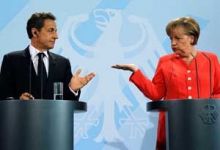The Day has asked Alexander RAHR, Russia and CIS program director at the German Council on Foreign Relations, and Dominic FEAN, expert at the French Institute of International Relations, to share their opinions about what these statements mean for Europe and Ukraine.
A.R. “There is no other solution. With the current mechanisms in place, neither the European Union nor the euro zone can operate. So a new framework for both needs to be constructed, and quickly at that, in order to rescue the idea of European stability and integration. I believe that the main thing Merkel and Sarkozy are proposing is strengthening the European government which will control expenditures of individual states and at the same time uniting the entire economic policy of member states. Brussels will increase its power in the European Commission to avoid such consequences as we have now in order to make countries cut their coats according to their cloth in this club. Why should countries pay for their neighbors? So a new European framework will be set up to keep this foundation and to give Europeans a future.
“Many people believe that there is no time to waste. With each passing day more powerful and specific decisions have to be made. I believe that if Germany and France join efforts and considering that this is what the EU’s biggest economies want to do with the support of others, it will finally become a reality.”
D.F.: “It is about revising the Treaty of Lisbon and securing budget and financial positions in the EU and in the euro zone in order to address weaknesses that emerged last year as a result of the crisis in Greece and Spain and this year in Italy.”
Are there reasons to implement a scenario under which Europe would disintegrate, as depicted by American futurologist Niall Fergusson in his article “Europe 2021”?
A.R.: “I believe that this scenario – Europe splitting into the North and the South – is quite real. But all of this is just speculation so far. No one can predict what will happen. I can say with certainty that year 2012 will be decisive for Europe and the world. A serious reconstruction of the entire system, primarily economic and financial, must take place. Europeans no longer have any other solution. But following the logic of things, it is true that for the euro zone to survive – and it suits many – only those countries that strive for financial discipline should be included. Those that cannot, do not want to or are no longer able to live with the euro and operate as other European countries do are likely to exit the zone.”
D.F.: “The main thing now is whether changes that will be implemented in the next months or years will open up opportunities for creating a two-speed Europe with a group of countries that can move faster and integrate more and those that move more slowly and are hesitant. But I don’t think that most EU member states support this scenario. From the French point of view, there is an understanding that closer integration of the economy within the euro zone is needed, but at the same time there is no desire for Europe to move ahead at two different speeds. If you take large countries, such as France, Germany, and Great Britain, they understand the need for coordination and securing relative stability of the European Union, even if some EU members are not able to quickly integrate in the economic sphere.”
You probably know that the European Parliament has recommended the European Commission to sign the Association Agreement with Ukraine by the end of 2011. Will Germany and France listen to this recommendation?
A.R.: “I don’t think that the Association Agreement will be initialed. However, it will be declared, particularly by Germany, that ratification will not happen if the existing conditions in Ukraine persist. Thus, this agreement will not become law. I believe that this will be the position of both Germany and the entire EU at the summit in Kyiv.
“Merkel’s position is quite clear. Today she has taken a tough stance also with regard to the Serbs whom she unceremoniously told that they need to recognize Kosovo’s independence if they want to find their way into the European Union. She didn’t mince her words at the Eastern Partnership summit in Poland. She said that from the viewpoint of Germany and Europe, human rights are being violated in Ukraine; democracy is weakening rather than getting stronger; and the judicial system is not being reformed. Ukraine must fix all of this if it wants to continue receiving Germany’s support for EU integration. She said these things on numerous occasions.”
D.F.: “First of all, I believe that the decision of the European Parliament makes sense. Initialing this document is a positive step and shows that the European union is interested in the agreement which has huge potential for Ukraine. Europe, particularly France, is not altogether sure what the motivation of the current government is. At the same time, Europe clearly understands that this agreement will be very beneficial to Ukraine in the long term. Therefore, signing this agreement, and its ratification in the future, will be good for Ukraine. The current uncertainty is about whether Ukraine is now really moving in the direction this agreement points in. In particular, we are talking about the condition of democracy in Ukraine and the situation with Yulia Tymoshenko. This is a concern for Paris. France will likely support signing the agreement, but I cannot say as much about other countries. So it cannot be said with certainty what will happen at the December summit.”
Could you please comment on the statement made by the European Parliament that the Russian Federation is putting too much pressure on Ukraine to keep it from forming a free-trade zone with European Union and pushing it to join the customs union with Russia, Belarus, and Kazakhstan.
A.R.: “We’re talking about geopolitics. And it’s a real thing. True, Russians trying to utilize this unique historical moment to forge the Eurasian Union involving Ukraine. The reason is that without Ukraine it’s no union at all. It’s just Russia and Kazakhstan, and that’s it. Ukraine is a reminder of the past. Russia together with Ukraine and Kazakhstan will be viewed seriously in economic and political terms. On its part, the European Union is doing its own thing and is warning Ukraine that if it joins the customs union, it will lose EU membership prospects for the future. Therefore, Ukraine is under pressure from both sides, and this is an unenviable position.”
D.F.: “I believe we need to take into consideration that it is crucial for Russia and its current integration project with Belarus and Kazakhstan – the Eurasian Economic Union – to get Ukraine involved. The success of this project largely hinges on the participation of Ukraine as the second largest post-Soviet country in terms of population which also has huge industrial potential. It is absolutely clear that Ukraine is an important economic factor in the region. The longevity of this project will be greatly boosted if Ukraine joins it. Russia has a number of arguments in its favor, particularly traditional cooperation and economic and trade connections between Ukrainian and Russian businesses. There is also the issue of energy relationships which is a constant topic of discussion between Moscow and Kyiv.
“The level of relations that Russia would like to see with Ukraine and the level of economic integration offered in the free trade zone between the EU and Ukraine are not compatible. So Ukraine has to figure out whether it will carry out a minimum number of reforms needed to integrate with Russia, which does not set high requirements, or implement true economic reform and change business practices to integrate with the EU market, which is much more difficult and will take much longer but is also more beneficial to the country in the long run.”
Is the EU doing everything it should to help Ukraine integrate with the EU? Is there an understanding in Europe that signing the Association Agreement in spite of the Tymoshenko case will help draw our country closer to the European community?
A.R.: “The European Union is making a disastrous mistake because of its own vanity – it’s hard to find a more fitting word. The EU ordered Ukraine: you have to behave so-and-so. But Ukraine is behaving differently. Many are not happy with it and are simply enraged. All Europe tells Ukraine to go this way, but it disobediently goes elsewhere. This is an irritant. But in fact it’s ridiculous. Incidentally, this is how the EU spoke to Serbia and Croatia. Perhaps, it is not the way to speak to Ukraine. But the EU is still trying to speak this way, so now the European Union has found itself in its own trap. Ukraine is not moving here or there – it is standing still. It has become proud – we won’t dance to the tune of the European Commission which demands an immediate release for Tymoshenko. I believe that everyone in Europe is stuck on this issue: release Tymoshenko, release her, as if there is nothing else.”
D.F.: “In contrast to Russia, the EU is not offering any political concessions. If the Yanukovych government believes that it can use the Tymoshenko case to obtain more concessions from Brussels and EU member states, it is mistaken. If the issue of democracy, handling the opposition parties and opposition leaders is not resolved, Yanukovych will damage his relationships with the EU partners, which will lead to deeper disappointment with Ukraine.
“Yanukovych has potential to improve relations with the EU, but to do so he needs to correct the impression that he is manipulating the state system to enhance his own political standing. The question arises about how deeply he believes in democratic principles. Otherwise Yanukovych will find himself in a quandary as he tries to integrate with the EU, because democratic principles are among the key requirements for developing relations with Brussels and EU member states and will define the future of our relations.”









